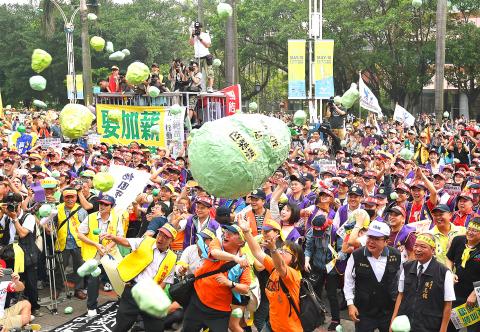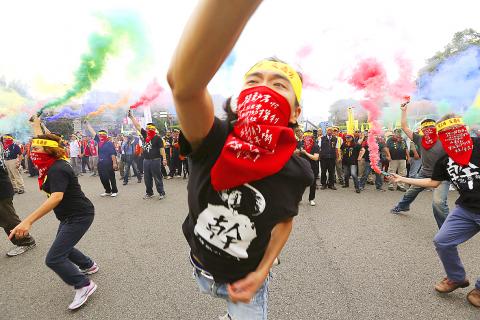Tens of thousands of labor union members and workers from various industries yesterday braved intermittent rain and took to the streets in Taipei on International Workers’ Day, demanding an immediate end to overwork, long working hours, stagnant salaries and the employment of temporary workers.
Holding flags and signs outlining their demands, more than 10,000 nurses, police officers, firefighters, migrant workers, flight attendants, pilots, teachers and finance workers gathered along Ketagalan Boulevard in front of the Presidential Office Building yesterday afternoon to protest against work exploitation and accuse the government of having turned a blind eye to their predicaments.
“We workers are no fools,” Taiwan Confederation of Trade Unions director-general Chuang Chueh-an (莊爵安), the leader of the rally, told the large crowd of protesters.

Photo: Liao Chen-huei, Taipei Times
“The government has rolled out several draft bills concerning basic-level employees since the nine-in-one elections and the awakening of civic groups last year … but without a stiff penalty and a government agency overseeing corporations, these bills will only end up creating more loopholes for employers,” Chuang said.
Singling out amendments to the so-called “four laws for pay raises” recently proposed by the Chinese Nationalist Party (KMT), Taoyuan County Confederation of Trade Unions chairman Chuang Fu-kai (莊福凱) said that even if the four draft bills were passed, they would still not be binding on corporations because there were no penalties stipulated for non-compliance.
“If corporations refuse to negotiate with labor unions and workers, there is nothing the government can do about it,” Chuang Fu-kai said. “These draft bills are just another ‘guava check’ issued by the government and legislators that aims only to attract votes and does workers no good.”

Photo: Reuters
Guava check (芭樂票) is a common colloquial Taiwanese term used to refer to bounced checks or broken promises.
Chuang Fu-kai was referring to draft amendments to the Company Act (公司法), the Factory Act (工廠法), the Labor Standards Act (勞動基準法) and the Small and Medium Enterprises Development Act (中小企業發展條例).
If passed, they would require companies to distribute profits, if any, to employees in the form of pay increases and bonuses. Tax cuts would also be provided for firms that offer salary increases to their employees.
Walking at the head of the rally — which set out from Ketagalan Boulevard at about 2pm and ended in front of the Legislative Yuan at about 3:30pm — were medical personnel, firefighters, police officers, flight attendants and foreign workers, because they are commonly perceived as the most exploited groups of employees in the nation.
A 23-year-old nurse, who wished to be identified only by her surname Chang (張), said there was a time during her previous employment at the Taipei Veterans General Hospital’s Hsinchu Branch that she passed out after her heavy workload allowed her to consume only a bottle of juice the entire day.
“Most of the time, only two nurses were on duty in the emergency department due to a severe personnel shortage. Not only were our health and well-being in jeopardy because of this, but also the lives of our patients,” Chang said.
Another 23-year-old hospital nurse, named Huang Yi-hsuan (黃奕萱), said her job often required her to work 16 hours straight and that she has been rushed to an emergency room three times since she started her current job due to exhaustion.
“Hospital authorities never understand the amount of pressure and work we face on a daily basis. All they care about is profit,” Huang said, adding that she was thinking about finding a less stressful job in the medical aesthetics industry.
A 28-year-old man surnamed Chen (陳), who identified himself as the close acquaintance of a police officer, said that because of staff shortages, police officers suffer from working hours that last as long as 12 hours a day and add up to 88 hours a month.
“Police work requires a high level of focus and often involves dangerous tasks. Having them work long hours is as hazardous as asking an exhausted surgeon to perform a delicate, complex surgery,” Chen said.
After arriving in front of the Legislative Yuan, protesters pelted papier-mache guavas toward the building in a symbolic gesture of giving back the “guava checks” to lawmakers.

NATIONAL SECURITY THREAT: An official said that Guan Guan’s comments had gone beyond the threshold of free speech, as she advocated for the destruction of the ROC China-born media influencer Guan Guan’s (關關) residency permit has been revoked for repeatedly posting pro-China content that threatens national security, the National Immigration Agency said yesterday. Guan Guan has said many controversial things in her videos posted to Douyin (抖音), including “the red flag will soon be painted all over Taiwan” and “Taiwan is an inseparable part of China,” while expressing hope for expedited “reunification.” The agency received multiple reports alleging that Guan Guan had advocated for armed reunification last year. After investigating, the agency last month issued a notice requiring her to appear and account for her actions. Guan Guan appeared as required,

A Vietnamese migrant worker yesterday won NT$12 million (US$379,627) on a Lunar New Year scratch card in Kaohsiung as part of Taiwan Lottery Co’s (台灣彩券) “NT$12 Million Grand Fortune” (1200萬大吉利) game. The man was the first top-prize winner of the new game launched on Jan. 6 to mark the Lunar New Year. Three Vietnamese migrant workers visited a Taiwan Lottery shop on Xinyue Street in Kaohsiung’s Gangshan District (崗山), a store representative said. The player bought multiple tickets and, after winning nothing, held the final lottery ticket in one hand and rubbed the store’s statue of the Maitreya Buddha’s belly with the other,

‘NATO-PLUS’: ‘Our strategic partners in the Indo-Pacific are facing increasing aggression by the Chinese Communist Party,’ US Representative Rob Wittman said The US House of Representatives on Monday released its version of the Consolidated Appropriations Act, which includes US$1.15 billion to support security cooperation with Taiwan. The omnibus act, covering US$1.2 trillion of spending, allocates US$1 billion for the Taiwan Security Cooperation Initiative, as well as US$150 million for the replacement of defense articles and reimbursement of defense services provided to Taiwan. The fund allocations were based on the US National Defense Authorization Act for fiscal 2026 that was passed by the US Congress last month and authorized up to US$1 billion to the US Defense Security Cooperation Agency in support of the

CLASSIFIED BRIEFING: The ministry said the special budget focuses on building a comprehensive defense system and strengthening the domestic defense industry The Ministry of National Defense yesterday released information on seven categories of weapons systems to be procured under a stalled NT$1.25 trillion (US$39.57 billion) special defense budget, including precision artillery, long-range missiles, air defense anti-tank missiles and more than 200,000 uncrewed aerial vehicles (UAVs). The Executive Yuan approved a draft version of the budget on Nov. 27 last year and submitted it to the legislature for review. The legislature’s Foreign Affairs and National Defense Committee yesterday invited Minister of National Defense Wellington Koo (顧立雄) to deliver a classified briefing and answer questions at a closed-door session. Koo said he hoped to provide lawmakers